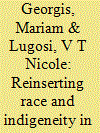| Srl | Item |
| 1 |
ID:
127897


|
|
|
|
|
| Publication |
2014.
|
| Summary/Abstract |
The common narrative of how International Relations (IR) has evolved is based on a chronological linear view of continual progress. This story divides the history of the discipline into phases punctuated by the three Great Debates. However, the analytical categories of race and indigeneity have been missing from all these debates; these erasures in the stories of IR are made possible through a series of ontological and epistemological manoeuvres. These in turn, structure a 'common sense' of what the boundaries of IR are, or what they should be. This is evident in the exclusion of what can be seen as major international security issues, which are largely ignored by the discipline. This paper employs an IR post-colonial perspective, using the example of sex trafficking in Canada and the US to demonstrate how the field of IR remains silent on its colonial legacy, with the wider aim of thinking about the implications that omission has for the discipline.
|
|
|
|
|
|
|
|
|
|
|
|
|
|
|
|
| 2 |
ID:
165065


|
|
|
|
|
| Summary/Abstract |
United Nations agencies report that by 1998, Iraqi infant mortality had risen from the pre-Gulf War rate of 3.7% to 12%. Insufficient food and medical supplies and deterioration of sewage and sanitation systems and electrical power systems reportedly caused an increase of 40,000 deaths annually of children under the age of 5 and of 50,000 deaths annually of older Iraqis. Why is this violence on Iraqis absent from analyses of sanctions in international relations and security studies? This paper is concerned with, first, situating sanctions against the Global South as violence by challenging the conventional theorisation of violence inflicted by the hegemon as a mechanism of ‘national security’. Second, we offer a decolonial reading of the sanctions imposed on Iraq by shifting the locus of enunciation from the state to Iraqi people’s suffering.
|
|
|
|
|
|
|
|
|
|
|
|
|
|
|
|